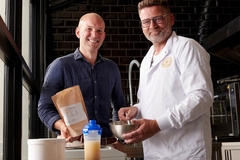
- Industry news
Industry news
- Category news
Category news
- Reports
- Key trends
- Multimedia
- Journal
- Events
- Suppliers
- Home
- Industry news
Industry news
- Category news
Category news
- Reports
- Key trends
- Multimedia
- Events
- Suppliers
The Protein Brewery nets €30M to boost US and EU mycoprotein commercialization
 CEO Thijs Bosch with Robert Catsburg, application manager and food chemist at The Protein Brewery (All image credits: The Protein Brewery).
CEO Thijs Bosch with Robert Catsburg, application manager and food chemist at The Protein Brewery (All image credits: The Protein Brewery).The Netherlands-based The Protein Brewery has raised €30 million (US$35.3 million) in investment to commercialize its fungi-based food ingredients in the US and EU, including its proprietary mycoprotein Fermotein.
The Series B equity follows the firm’s Series A round raised four years ago, to scale its Fermotein innovation.
Due to its “tasteless and odorless” quality, the ingredient finds applications in baked snacks, dairy substitutes such as yogurts, and nutritional products including protein shakes, functional bars, and meal replacement drinks. It contains nearly 50% complete protein and 35% fiber.
The Breda-based company leverages Rhizomucor pusillus, a thermophilic fungus known for thriving at higher temperatures, to develop its sustainable alt- proteins.
It plans to use the funds to strengthen sales and application expertise, ensuring “Fermotein meets the needs of food manufacturers worldwide,” CEO Thijs Bosch tells Food Ingredients First. Fermotein’s commercialization aims to accelerate business growth in key market segments.
“[We plan to] expand production at the Mijkenbroek facility to an annual capacity of 2,500 metric tons, solidifying our readiness for large-scale commercialization, and develop the Fermotein innovation platform, unlocking new possibilities in nutrition and product applications.”
New investors Invest-NL and the Brabant Development Agency facilitated the funds, along with existing capital providers Novo Holdings, Unovis Asset Management, and Madeli.
Fermenter to protein
Bosch explains that the company grows the Fermotein biomass in fermenters under specific conditions, after which it is sieved and pasteurized.
 The company chose to produce Fermotein as a powder, making it easier to export to markets like the US and Singapore.“The product is then further de-watered and dried. The dried Fermotein is milled to achieve the desired particle size and packed in bags for shipment to our customers.”
The company chose to produce Fermotein as a powder, making it easier to export to markets like the US and Singapore.“The product is then further de-watered and dried. The dried Fermotein is milled to achieve the desired particle size and packed in bags for shipment to our customers.”
However, fermentation in non-sterile conditions presents challenges and requires “real skill and expertise,” according to Bosch.
“We have an experienced team in place where we combine R&D experience with manufacturing know-how to optimize the growing conditions for our fungal biomass.”
“Scaling from a pilot plant (100 liter fermentation) to a scale-up factory (with 90,000 liter fermentation) has also been a big step, but we have consistent progress in optimizing our production process,” he emphasizes.
Reducing alt-protein costs
Describing the cash injection as a “springboard for global expansion,” the team aims to redefine how food is made: nutritious, sustainable, and scalable at a lower cost.
Fermotein’s production process is significantly less capital-intensive than most alternative proteins, notes the company.
“At full scale, we believe we can be more sustainable, with lower water use, land use, and less CO2 output, and can therefore also be more cost-effective. Moreover, our production process is less capital-intensive, due to the different process conditions from our strain,” explains Bosch.
The company mainly uses glucose as a feedstock for the fungi, and is now working on a solution to utilize sugar-rich by-products as well.
 Fermotein is grown in large-scale fermenters under controlled conditions before being dried and milled into a powder.
Fermotein is grown in large-scale fermenters under controlled conditions before being dried and milled into a powder.
Expanding fermentation capacity
The Mijkenbroek factory in Breda is a demo-scale plant with an approximate capacity of 500 metric tons per year. By adding additional fermentation capacity at the same site, the firm can expand it to 2,500 metric tons.
“The next step after this is a large-scale industrial site with a production partner, where we can produce more than 10,000 metric tons of Fermotein,” underscores Bosch.
“We made a conscious choice to produce a powder instead of a ‘wet mycoprotein.’ We can now easily export Fermotein to markets like the US and Singapore, and apply our ingredient in many applications, including in the Active Nutrition segment.”
The commercial team is also preparing for market launch in the EU and UK, which will follow once the regulatory approval is in place.
Besides versatility and scalability, Fermotein also offers high-quality protein and essential fibers, with the company also exploring its role in satiety and metabolic health, particularly GLP-1 pathways.
“We are putting a lot of focus on the nutritional value of Fermotein and how we can quantify the health benefits and nutritional benefits of our ingredient.”
“We are actively looking for strategic partners to achieve this. Moreover, we are looking at expanding our fermentation platform to expand our portfolio of ingredients,” Bosch concludes.











